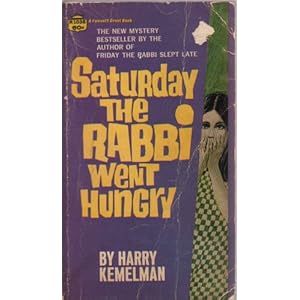
Since I've been reading these books in entirely random order - whenever I happen to find one - I've unwittingly allowed myself the pleasure of popping back and reading some of the earlier, better books in the series. This comes after already seeing how Harry Kemelman, out of touch with any but his Centrum Silver-aged readers, had let his Rabbi David Small series descend into mediocrity and, in the end, awfulness.
However, in 1966, he was still at the height of his powers, and building the rules for his fun little detective adventures. Saturday the Rabbi Went Hungry, like the later books, is certainly not going to be essential reading for more devoted fans of hard-boiled fiction. It's a cozy, cute story about community politics and backstabbing, touchy members of the rabbi's temple, and well over halfway through the book, the characters finally figure out that a death is neither a suicide nor an accident, but murder.
Actually, I really enjoyed the pace, reflecting the confusion about the death. The initial investigation is just for insurance purposes, with a hefty settlement waiting on confirmation that the deceased took his own life. Reading a book like this, from the perspective of the present, the audience is certainly going to know that the fellow was deliberately killed, but the leisurely pace around this point is actually kind of charming, and I really liked how the question suddenly gets the rabbi in trouble with one of the more powerful members of his temple. With the deceased already buried as an accident, and the sudden possibility of him having to be exhumed and moved as a suicide after the rabbi's made a tough ruling elsewhere about whether fasting includes medicine, and the resulting withholding of medicine being suicide, Kemelman might well have tricked his 1960s audience into thinking that this was the principal conflict.
Dated, of course, and not for everybody, but I enjoyed it, and I wonder whether the next couple of Kemelman novels that I've found will prove as amusing.
No comments:
Post a Comment